PRINCE ALBERT
On the streets of a Karoo town – where drugs, drink and poverty await a lost generation
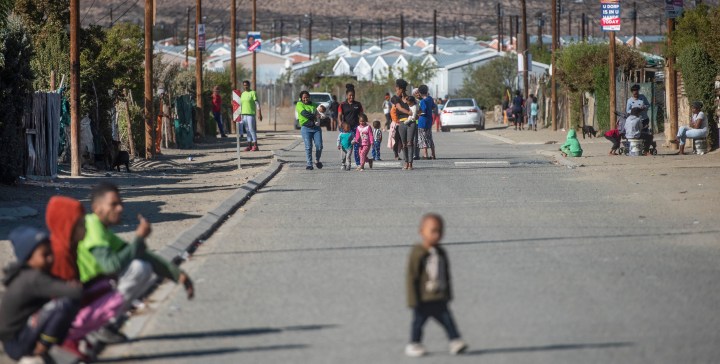
In the small town in the Karoo children drop out of school amid daunting problems: unemployment, substance abuse, teen pregnancy and neglect.
It’s just after 10am, midweek in North End, Prince Albert in the Karoo. About 35 children aged between one and six are running around at the Bambino crèche. They are safe inside the centre, but other children are roaming around the community unsupervised – in an area where there is a problem of substance abuse, unemployment and, according to some, a lack of parental responsibility.
Children run in the streets; some play in yards. Three children were playing near what seemed to be a fire in someone’s backyard.
Prince Albert has a population of 14,671, with just more than 4,000 under the age of 14. Residents agree that the area faces major problems with its children and young people, relating to substance abuse such as drugs and alcohol, unemployment and poverty.
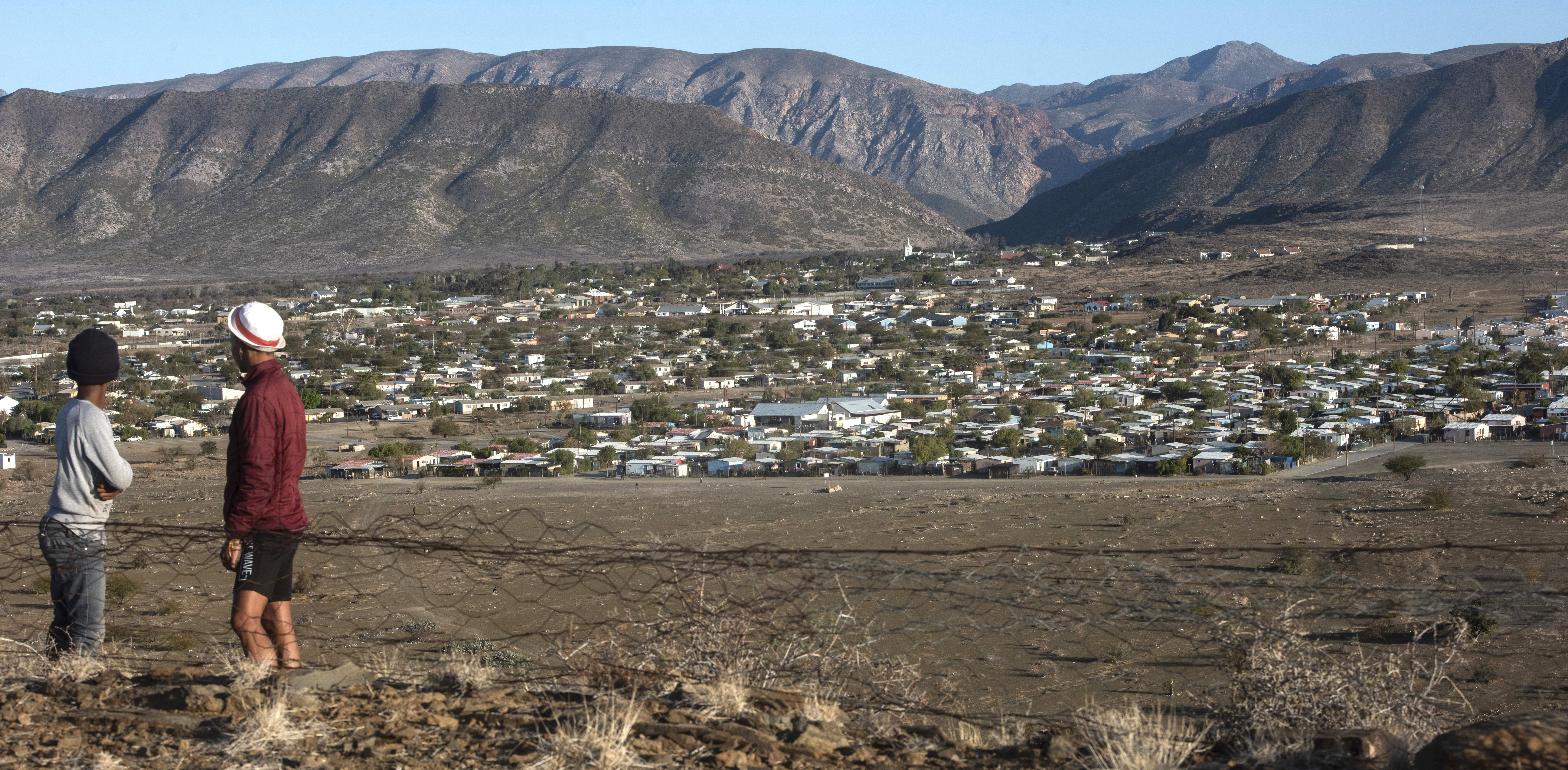
A view of Ward 4 (North End) in Prince Albert (Photo: Brenton Geach)
According to the Socio-Economic Profile of the Prince Albert Municipality in 2020, only 2,141 pupils are enrolled at the five schools in the municipality – a drop from 2,146 in 2019. The profile warns that Prince Albert has one of the lowest (67%) school retention rates compared with the Central Karoo (78.4%). Economic factors such as unemployment and poverty, along with social factors such as teenage pregnancy, are among the influences on these low retention rates. The town’s teenage pregnancy rate was 11.9%.
Nationally, figures paint an alarming picture of school dropouts: 3% of 15-year-olds and 9% of 17-year-olds dropped out in 2021, according to Stats SA. Nationally there was a decline in children aged 0 to four attending preschool. In 2019, the figure stood at 36.8% but by 2021 it had dropped to 28.5%.
During DM168’s visit to Prince Albert, community workers and politicians spoke at length about several issues: a lack of parental responsibility, especially among young parents, substance abuse and a lack of opportunity made worse by young people dropping out of school.
At the Bambino crèche – the oldest one in Prince Albert, founded in 1991 – sat Lena Miggels (61). After working there for 30 years, she will retire this year.
“I would say there is a future for our children but only if our parents come to their senses – then our children will have a future. “it’s an evil – the drink, the drugs, that tik – it’s really a problem,” Miggels said.
She went on: “The majority of the children are young mothers’ children.”

Prince Albert resident Lena Miggels inside the Bambino crèche, the oldest in the area. She’s been at the crèche since it opened in the 1990s but will retire soon, at 60. (Photo: Brenton Geach)
Parents received child support grants of R480, she said, but they were not spent on children’s welfare. When both parents were out of work, they depended on the grant money for their own needs.
Miggels said that what was needed was more interventions from organisations such as Badisa, a church-sponsored nonprofit, to coach parents on parental responsibility.
The principal of Bambino crèche, Beulah Wehr (43), echoed Miggels’s sentiments about younger people having children, adding: “These are parents that don’t know how to take responsibility properly and now they let their children suffer under this.”
Wehr’s three children have all passed through Miggels’s hands at the crèche, including one who is studying to become a teacher.
She suggested entities such as the South African Social Security Agency needed to teach parents how to spend their grant allocations correctly by using them for their children’s welfare.
Wehr said parents are often unable to pay the monthly R150 fee, which leaves the crèche employees without salaries. It has three permanent teachers, three trainee teachers and a cook, none of whom receives a salary.
“It isn’t about the money, for us it’s about the love for the children… we took an oath, you won’t be there for the money, but you will be there for the child’s upbringing… at the end of the day, everyone needs finances, you have a house,” Wehr said.
Visit Daily Maverick’s home page for more news, analysis and investigations
Aside from the limited income from fees, a donor provides R2,000 per month to the crèche. They’re still waiting for support from the local and provincial government, and support is non-existent from Prince Albert’s businesses or wealthier residents.
When asked what kind of support they would need from the town’s businesses or wealthier residents, Wehr said: “They don’t need to do anything, they need to have love in their hearts. If they don’t have love in their hearts, they won’t open their arms.” She said businesses don’t even need to provide money to the crèche, but could donate necessary items such as electricity, checking to see if Bambino has gas or even sending a packet of sugar.
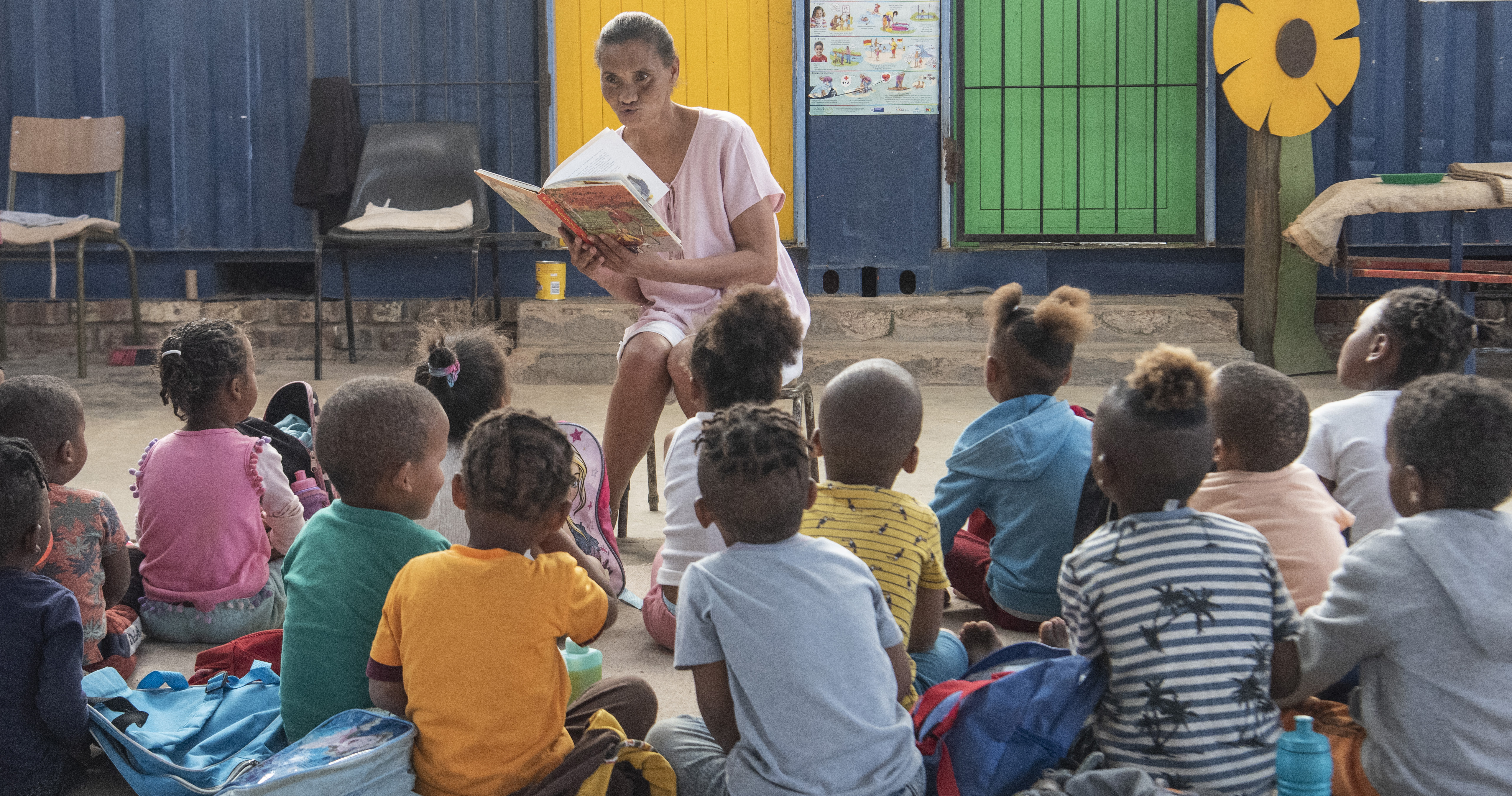
Bambino crèche principal Beaulah Wehr reads to a group of children. The crèche has just more than 50 children, but she says many parents cannot afford the R150 fee. (Photo: Brenton Geach)
In another part of North End, Lucrecia Darries (37) sits in her home. She used to run a soup kitchen until last year for children between the ages of 10 months and 13 years. It was started in 2020 and provides breakfast and lunch for up to 50 children twice a week.
However, Darries’s soup kitchen stopped operating because of a lack of support – she is unemployed, relies only on her husband’s income and could not get any sponsors for her soup kitchen.
And while the soup kitchen has closed, children still arrive at Darries’s home, asking for food. “This morning there was a girl asking for a slice of bread,” she said.
According to the Child Gauge 2021/2022, child poverty rates in the Western Cape increased from 27% (2019) to 46% (2020).
Describing Prince Albert, Darries said it was calm, “but there is poverty too – as a result of alcohol, drugs, the children suffer”. She said joblessness was a major problem in the community. While there were jobs in the municipality in places such as the hospital, jail or courts, “at all times, you need matric and most of our young people drop out of school so they don’t have matric”.
During the by-election held on Wednesday 14 September, DM168 spoke to three ward candidates who expanded on some of the issues within the community.
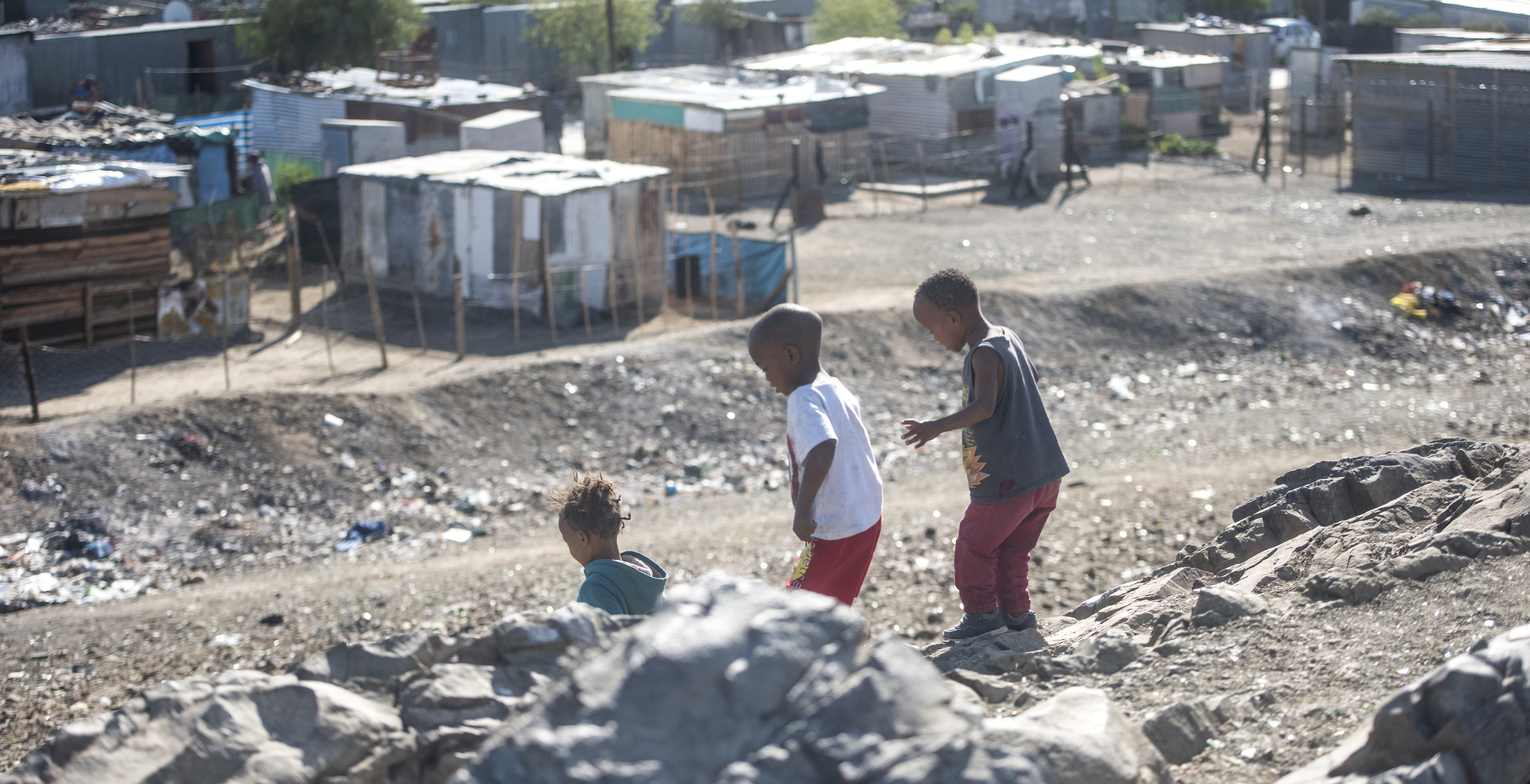
Very young children play alone on a rocky hilltop near to the informal settlement of Rondomskrik in Prince Alfred. (Photo: Brenton Geach)
Winner of the by-election held on Wednesday, 14 September and former mayor Margy Jaftha (DA) said one of the reasons for school dropouts was the Covid-19 disruptions, where children went to school in different groups on alternate days.
Jaftha was the chairperson of the governing body of one of the local schools and said this was something that was being looked into.
“It’s a big problem with these dropouts because lots of these children are up to mischief,” she said, adding that it was both primary and secondary school learners that dropped out.
“There are too many of our small children that are walking around and I think something needs to be done.”
Government’s response
Western Cape Commissioner for Children Christina Nomdo told DM168 that her office will release a report within the next few weeks detailing children’s perspectives of community safety, dreams and worries – and recommendations specifically related to the area.
The Children’s Commissioner, a first-in-its-kind office in the country, is an independent institution that must work to protect and promote the rights, needs and interests of children by working with various provincial departments. Only the Western Cape has such as office, with Nomdo being appointed in June 2020.
Nomdo told Daily Maverick the office conducted child rights workshops in the Prince Albert municipal area, including Prince Albert, Leeu-Gamka, Klaarstroom and Seekoegat during November 2021. “The report will detail children’s perspectives of community safety, their dreams and worries as well as recommendations to government for service improvement,” said Nomdo.
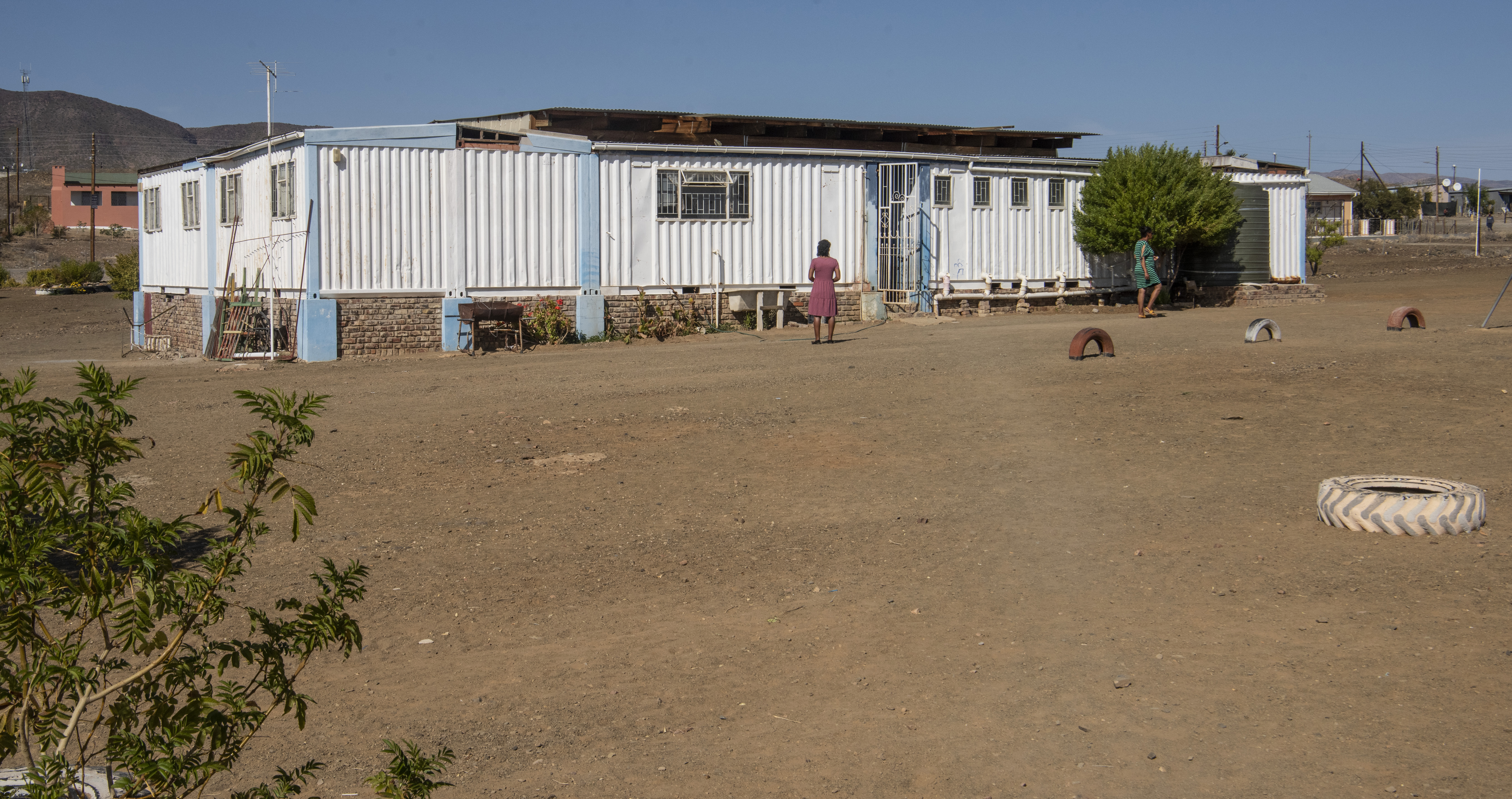
The Bambino crèche, the oldest in Prince Albert. (Photo: Brenton Geach)
The office has a child government monitor and two from the nearby Leeu-Gamka who keep Nomdo abreast about their lived realities, she said.
“One of the key findings in the Commissioner’s report will focus on the need for government to strengthen families, for example, with parenting support programmes and to provide prevention and early intervention programmes,” said Nomdo.
The provincial Department of Social Development (DSD) told DM168 that it was aware of the increasing poverty, unemployment and substance use disorder within Prince Albert. A local DSD office at the Thusong Service Centre provided referrals to any individuals who required such services.
Regarding the teenage pregnancies and responsibilities of having children, the DSD said along with its own services, entities like Badisa have “several preventions and early intervention services that involve risk assessments of young and first-time mothers, counselling, psycho-social support and referrals to appropriate additional support services”. DM168




















 Become an Insider
Become an Insider
“They’re still waiting for support from the local and provincial government, and support is non-existent from Prince Albert’s businesses or wealthier residents.”
This really surprises me as Prince Albert appears to be a tight-nit community. I wonder if it is correct? Perhaps some of the local “businesses or wealthier residents” could respond?
The situation is heartbreaking indeed & it is easy to become despondent. However this type of journalism by Suné Payne is lazy & sensationalist and does not recognize the great work done by the community of Prince Albert. Many of the businesses & residents (and not only the wealthiest) are working together to create opportunities every day. (Skills School, PACT, cycling, Journey to Jazz, etc.)
I conducted participative research & facilitated a local strategy to address many of these things in PA & the Central Karoo, while at the CSIR in the early 2000’s. It’s as though the end of apartheid flew over on a jet plane & nobody looked down. Every day is a day lost to a self-perpetuating cycle of poverty & deprivation. Bottle store owners getting rich just as they always have, selling a brief escape from harsh realities. No hope, no dreams. Political change put paid to the strategy we facilitated, almost the minute it was adopted. Tragedy is, nothing seems to have changed. It’s still about children giving birth to children & being blamed for not caring for them. How can they? Parenting is hard enough for sober adults, let alone for children, who deserve to be carefree. Yet, With systemic intervention, PA could be a good place for everyone who lives there. What does it look like when its fixed? There are thriving tourist & art trades. Invest in healthy families, small opportunities for livelihoods, intervene for today’s pregnant mothers, help them bond with their babies, encourage families to support them, train young women to deliver ECD services & to train other young mothers, get shops to offer specials on nutritious food & school kit on all-pay days, limit sale of alcohol, engage community members in developing ideas that monetise the extraordinary environment, local traditions, ideas for tourist activities, guiding, art. And invest in parenting education for boys.